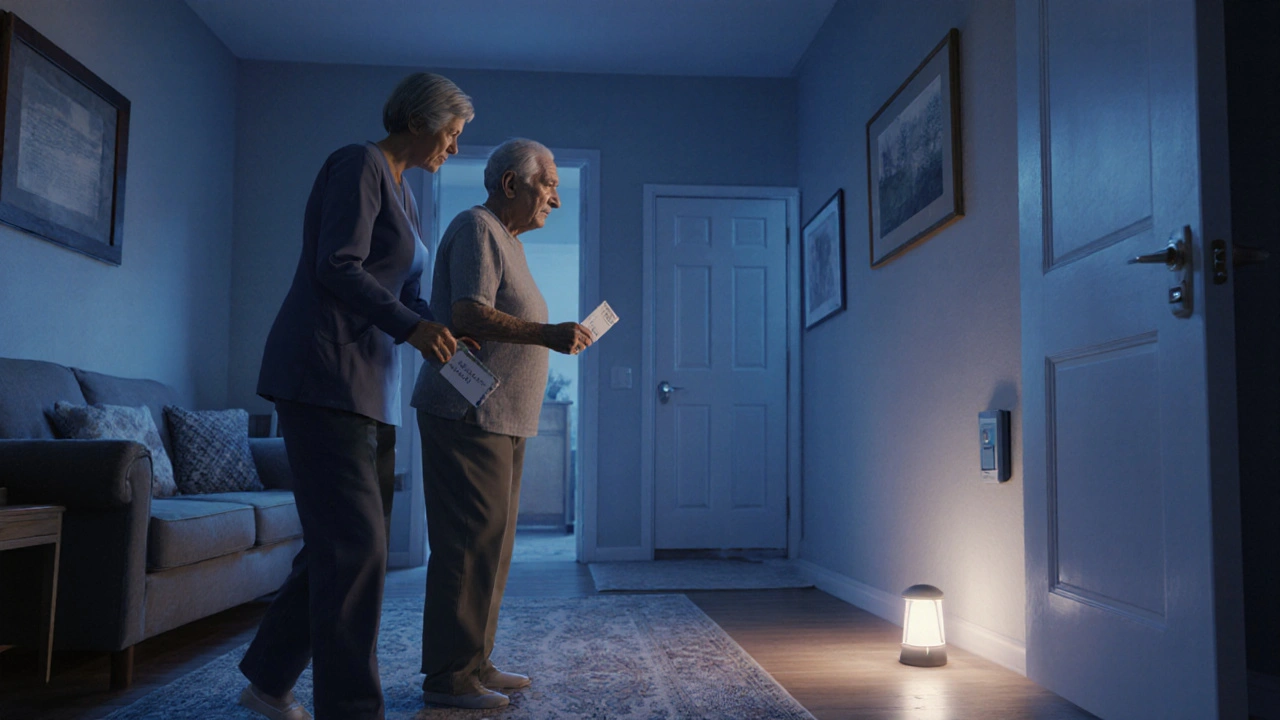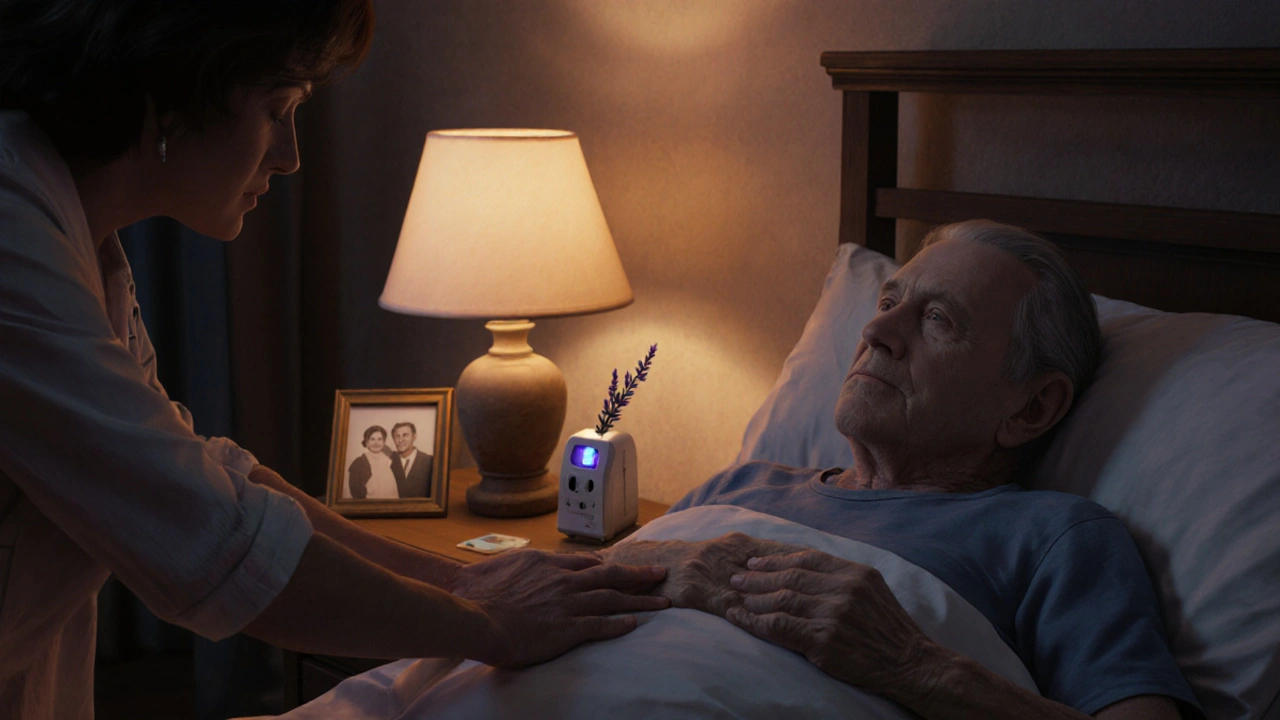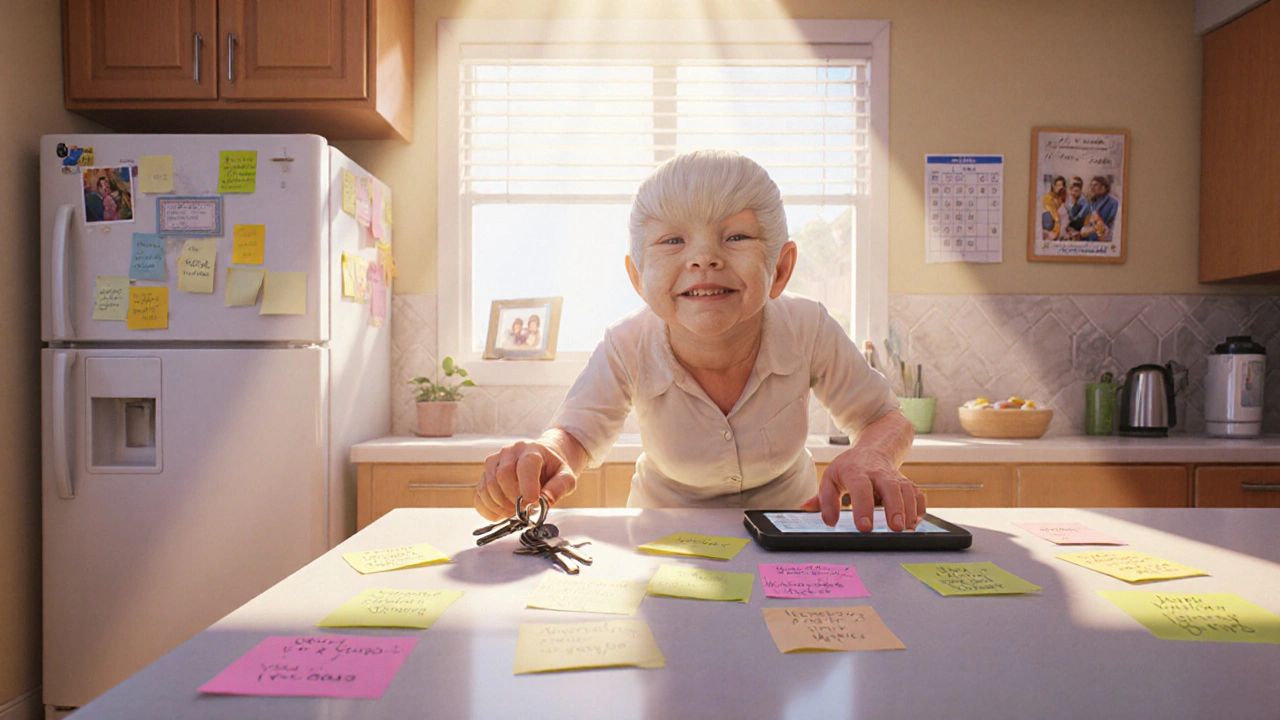When it comes to navigating Dementia of the Alzheimer's type is a progressive neurodegenerative disorder marked by memory loss, impaired reasoning, and personality changes, knowing the Alzheimer's dementia stages can make the journey less frightening for families and caregivers. This guide walks you through what typically happens in the early, middle, and late phases, shares practical tips for daily care, and highlights key decisions you’ll face along the way.
Understanding the Disease Landscape
Alzheimer's disease is the most common cause of dementia, accounting for 60‑80% of cases worldwide. It starts silently, with subtle changes that most people dismiss as normal aging. Over time, two hallmark brain abnormalities - amyloid plaques and clumps of beta‑amyloid protein that accumulate between neurons and neurofibrillary tangles, twisted fibers of tau protein that disrupt neuronal transport - damage communication pathways and trigger cell death.
Clinicians often use the term Mild Cognitive Impairment (MCI) is a transitional stage where memory problems are noticeable but do not yet interfere with everyday independence. Not everyone with MCI progresses to full‑blown dementia, but it’s a useful checkpoint for early intervention.
Early (Mild) Stage: Subtle Shifts
In the early stage, most people can still live independently, but they start missing details. Typical signs include:
- Occasional forgetfulness (misplacing keys, repeat questions)
- Difficulty finding words during conversations
- Minor challenges with complex tasks like managing finances
Screening tools such as the Mini‑Mental State Examination (MMSE) is a 30‑point questionnaire that assesses orientation, recall, attention, and language help doctors confirm the diagnosis and establish a baseline.
Care tips for the early stage:
- Introduce a simple daily routine-breakfast, medication, short walk-so the brain has predictable cues.
- Use calendars, sticky notes, and smartphone reminders to compensate for memory gaps.
- Encourage mental stimulation: puzzles, reading, or a hobby that challenges the mind.
- Discuss advance care planning is the process of documenting wishes for future medical treatment and living arrangements while the person can still voice preferences.
Middle (Moderate) Stage: Growing Dependence
When the disease moves into the middle stage, daily life starts to require assistance. Common developments include:
- Frequent forgetting of recent events, even with reminders
- Difficulty recognizing familiar faces, leading to confusion or agitation
- Problems with dressing, bathing, and managing money without help
- Emergence of behavioral and psychological symptoms of dementia (BPSD) is a range of mood changes, agitation, wandering, and hallucinations
Medication such as cholinesterase inhibitors are drugs like donepezil or rivastigmine that modestly improve cognition and daily functioning may be prescribed, though benefits vary.
Key strategies for caregivers:
- Establish safety measures-remove tripping hazards, install night‑lights, and consider door alarms to prevent wandering.
- Break tasks into smaller steps; use visual cue cards for dressing or grooming.
- Address BPSD early: validate emotions, maintain a calm environment, and consult a doctor before using antipsychotics.
- Watch for caregiver stress is the emotional, physical, and financial strain experienced by those providing unpaid care. Take regular breaks, join support groups, and explore respite services.

Late (Severe) Stage: Total Assistance Required
The final stage is marked by profound cognitive decline and loss of most functional abilities. Typical signs are:
- Inability to recognize close family members
- Loss of speech-only a few words or sounds remain
- Complete dependence for eating, toileting, and mobility
- Frequent infections, especially pneumonia, due to swallowing difficulties
At this point, the focus shifts from slowing decline to ensuring comfort and dignity. Palliative care teams can help manage pain, prevent bedsores, and guide families through end‑of‑life decisions.
Practical considerations:
- Consider a specialized memory‑care facility if home care becomes unsafe.
- Ensure nutrition through soft or tube feeding only when medically indicated and aligned with the person’s wishes.
- Maintain a calm environment-soft music, familiar scents, and gentle touch can reduce agitation.
- Document any legal directives, such as a lasting power of attorney, to avoid last‑minute confusion.
Comparison of the Three Stages
| Aspect | Early (Mild) | Middle (Moderate) | Late (Severe) |
|---|---|---|---|
| Memory | Forget recent events, word‑finding difficulty | Frequent forgetting, may not recognize familiar people | Loss of both recent and remote memories |
| Daily living | Mostly independent, occasional assistance | Needs help with dressing, bathing, finances | Full dependence for all activities |
| Communication | Still conversational, occasional pauses | Reduced vocabulary, may repeat phrases | Minimal speech, may only utter sounds |
| Behavior | Mild irritability, anxiety | Wandering, agitation, hallucinations possible | Quiet, may become bed‑bound, risk of infections |
| Medical focus | Diagnosis confirmation, medication start | Symptom management, safety planning | Palliative care, comfort measures |

Planning for the Future
Even though Alzheimer’s progresses unpredictably, having a roadmap eases stress. Important steps include:
- Legal documents: Durable power of attorney, living will, and guardianship papers.
- Financial planning: Review insurance, explore Medicaid eligibility, and consider long‑term care financing.
- Home modifications: Install grab bars, remove loose rugs, and opt for single‑pane doors.
- Community resources: Local dementia support groups, home‑health agencies, and respite care programs.
Remember, the journey is highly individual. Some people linger in the early stage for years, while others transition faster. Regular check‑ins with a neurologist or geriatrician keep the care plan aligned with the current reality.
Frequently Asked Questions
Frequently Asked Questions
How long does each stage typically last?
The early stage can last from 2 to 4 years, the middle stage 3 to 6 years, and the late stage 1 to 3 years, but individual trajectories vary widely.
Can medication stop the disease?
Current drugs, such as cholinesterase inhibitors and memantine, can modestly slow symptoms but do not cure or halt the underlying neurodegeneration.
When should I consider moving to a care facility?
If safety becomes a daily concern-frequent wandering, falls, or inability to manage basic hygiene-professional memory‑care facilities can provide 24‑hour supervision and medical support.
What are effective ways to reduce caregiver burnout?
Schedule regular breaks, join support groups, use respite services, and maintain personal health through exercise and social activities.
Are there lifestyle changes that can delay progression?
A heart‑healthy diet, consistent physical activity, cognitive stimulation, and good sleep hygiene are linked to slower cognitive decline in many studies.


Michael Barrett
October 16, 2025 AT 13:10When you consider the early stage of Alzheimer’s, it’s not merely a list of forgetful moments, but a complex cascade of neural disruption, a subtle erosion of synaptic connectivity, and-crucially-the onset of compensatory strategies; caregivers should therefore implement structured routines, leverage mnemonic aids, and, above all, document advance directives before autonomy wanes.
Inma Sims
October 16, 2025 AT 14:00While your comprehensive outline is commendably exhaustive, one might note that the tone borders on the sanctimonious, which, frankly, adds a delightful layer of gravitas to an otherwise routine checklist.
Gavin Potenza
October 16, 2025 AT 15:06Alzheimer’s disease is, at its core, a progressive unraveling of the brain’s intricate architecture, and that fact alone should prompt us to reevaluate how we allocate societal resources. The early phase often masquerades as ordinary aging, leading families to dismiss warning signs until functional decline becomes undeniable. In this window, early detection through tools like the MMSE can make a tangible difference, not just for symptom management but for planning. Routine cognitive exercises, such as crossword puzzles or learning a new language, have been shown to bolster neuroplasticity, albeit modestly. Dietary considerations, particularly adherence to the Mediterranean diet, correlate with slower cognitive decline, reinforcing the mind‑body connection. Physical activity, even a brisk thirty‑minute walk, stimulates cerebral blood flow and appears to mitigate plaque formation. Equally important is establishing a support network; not only does it alleviate caregiver burden, but it also provides emotional scaffolding for the patient. As the disease advances into the moderate stage, behavioral disturbances like agitation and wandering become prominent, necessitating environmental modifications-night lights, secured doors, and clutter‑free pathways. Pharmacologic interventions, such as cholinesterase inhibitors, offer limited symptomatic relief, and their benefits must be weighed against side‑effects on a case‑by‑case basis. The caregiver’s mental health is at risk; burnout is a genuine hazard, and regular respite should be scheduled proactively. Legal documentation-power of attorney, living wills-should be executed early, preserving the patient’s autonomy while providing clear guidance for future decisions. In the severe stage, the focus undeniably shifts toward palliative care, emphasizing comfort, dignity, and the mitigation of infection risks, especially pneumonia. Communication with the patient may dwindle to simple verbal cues or soothing music, underscoring the importance of a calm, familiar environment. Advanced directives regarding feeding tubes and resuscitation become ethically complex, and multidisciplinary teams are essential for navigating these choices. Finally, community resources, ranging from local support groups to national Alzheimer’s societies, can offer invaluable education and financial assistance. By integrating medical, psychological, and social strategies, we can construct a comprehensive care plan that respects both the individual’s humanity and the family’s resilience.
Virat Mishra
October 16, 2025 AT 16:30Another guide about the same old stuff
Daisy Aguirre
October 16, 2025 AT 17:53Hey there! 🌟 Remember, every small victory-like a familiar face recognized or a cherished hobby rekindled-lights up the dark tunnel of dementia. Celebrate those moments with music, photo albums, or a favorite scent; they create priceless connections that echo far beyond the disease. Keep the atmosphere upbeat, because optimism isn’t just a feel‑good buzzword-it’s a genuine therapeutic ally for both the person with Alzheimer’s and their caregivers.
Natalie Kelly
October 16, 2025 AT 19:16Dont forget to set up a daily med reminder on ur phone.
Tiffany Clarke
October 16, 2025 AT 20:40It breaks my heart watching families juggle hope and helplessness
Sandy Gold
October 16, 2025 AT 22:03Honestly, the so‑called “cognitive stimulants” are overrated; plenty of studies show no signifcant benefit, so why waste time on puzzles that dont change the pathology.
Frank Pennetti
October 16, 2025 AT 23:26From a policy standpoint, the federal failure to prioritize neuro‑degenerative research is a blatant abdication of duty; we need a concerted, top‑down initiative that allocates billions to biotech pipelines, otherwise our nation lags behind global competitors.
Adam Baxter
October 17, 2025 AT 00:50Stay strong Keep pushing forward
Keri Henderson
October 17, 2025 AT 02:13Make a weekly schedule that includes short, enjoyable activities-this not only keeps the mind active but gives you a structured break from caregiving duties.
elvin casimir
October 17, 2025 AT 03:36It’s irrefutable that caregivers often neglect proper grammar in stress-filled notes; however, maintaining correct punctuation is essential for clear communication, especially when legal documents are involved.
Steve Batancs
October 17, 2025 AT 05:00According to recent epidemiological data, approximately 6 million Americans are living with Alzheimer’s, accounting for 11% of all dementia cases; this underscores the urgency for comprehensive healthcare strategies.
Ragha Vema
October 17, 2025 AT 06:23Behind the glossy brochures lies a hidden agenda-pharma giants profit from our helplessness, and the “new drug” hype is just a smokescreen to keep us buying hope instead of seeking real solutions.
Scott Mcquain
October 17, 2025 AT 07:46When we speak of dignity in Alzheimer’s care, we must also confront the moral imperative to allocate resources equitably; neglecting the vulnerable, whether intentionally or through systemic oversight, is an ethical failing that society cannot excuse.
kuldeep singh sandhu
October 17, 2025 AT 09:10Perhaps the emphasis on early diagnosis is overblown; after all, knowing the inevitable may cause unnecessary anxiety.
Mariah Dietzler
October 17, 2025 AT 10:33This article is just another rehash of old info, nothing new.